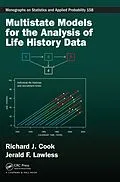Multistate Models for the Analysis of Life History Data provides the first comprehensive treatment of multistate modeling and analysis, including parametric, nonparametric and semiparametric methods applicable to many types of life history data. Special models such as illness-death, competing risks and progressive processes are considered, as well as more complex models. The book provides both theoretical development and illustrations of analysis based on data from randomized trials and observational cohort studies in health research. It features: Discusses a wide range of applications of multistate models, Presents methods for both continuously and intermittently observed life history processes, Gives a thorough discussion of conditionally independent censoring and observation processes, Discusses models with random effects and joint models for two or more multistate processes, Discusses and illustrates software for multistate analysis that is available in R, Target audience includes those engaged in research and applications involving multistate models.
Autorentext
Richard Cook is Canada Research Chair in Statistical Methods for Health Research at the University of Waterloo. He has received the Gold Medal of the Statistical Society of Canada and is a Fellow of the American Statistical Association. He collaborates and consults widely on health research and has given many short courses. He and Dr. Lawless previously coauthored the influential book, The Statistical Analysis of Recurrent Events (Springer, 2007).
Jerald Lawless is Distinguished Professor Emeritus at the University of Waterloo. He is a Fellow of the Royal Society of Canada, a Gold Medal recipient of the Statistical Society of Canada and Fellow of the American Statistical Association. He is a past editor of Technometrics and has collaborated and consulted in numerous areas. He has presented many short courses, with Dr. Cook and individually.
"The authors of the book are internationally renowned experts in the field of multi-state modeling and have written an extremely clear and comprehensive book on the topic that covers many different aspects, from the fundamental theory to the practical side of analyzing data and interpreting results. The examples are well chosen to represent the most common types of multi-state processes that public health researchers could encounter. The inclusion of software code to illustrate how the models can be fit and interpreted is especially helpful to readers." (Mimi Kim, Albert Einstein College of Medicine)
Klappentext
Multistate Models for the Analysis of Life History Data provides the first comprehensive treatment of multistate modeling and analysis, including parametric, nonparametric and semiparametric methods applicable to many types of life history data. Special models such as illness-death, competing risks and progressive processes are considered, as well as more complex models. The book provides both theoretical development and illustrations of analysis based on data from randomized trials and observational cohort studies in health research. It features: Discusses a wide range of applications of multistate models, Presents methods for both continuously and intermittently observed life history processes, Gives a thorough discussion of conditionally independent censoring and observation processes, Discusses models with random effects and joint models for two or more multistate processes, Discusses and illustrates software for multistate analysis that is available in R, Target audience includes those engaged in research and applications involving multistate models.
Inhalt
Preface
List of Figures
List of Tables
Glossary
Abbreviations
- Introduction to Life History Processes and Multistate Models
- Event History Processes and Multistate Models
- Multistate Analysis Based on Continuous Observation
- Some examples of analysis with multistate models
Life History Analysis with Multistate Models
Some Illustrative Studies
Disease Recurrence Following Treatment in a Clinical Trial
Complications from Type Diabetes
Joint Damage in Psoriatic Arthritis
Viral Load Dynamics in Individuals with HIV Infection
Introduction to Multistate Processes
Counting Processes and Multistate Models
Features of Multistate Processes
Marginal Features and Partial Models
Some Aspects of Modeling, Analysis and Design
Objectives
Components of a Model
Study Design and Data
Software
Introduction to Some Studies and Dataframes
A Trial of Breast Cancer Patients with Skeletal Metastases
An International Breast Cancer Trial
Viral Rebounds in HIV-positive Individuals 0
Viral Shedding in HIV Patients with CMV Infection 0
Bibliographic Notes
Problems
Intensity Functions and Counting Processes
Likelihood for Multistate Analyses
Product Integration and Sample Path Probabilities
Time-Dependent Covariates and Random Censoring
Some Important Multistate Models
Modulated Markov Models
Modulated Semi-Markov Models
Models with Dual Time Scales
Models Accommodating Heterogeneity
Linked Models and Local Dependence
Process Features of Interest
Simulation of Multistate Processes
Bibliographic Notes
Problems
Maximum Likelihood Methods for Parametric Models
Markov Models
Semi-Markov Models
Multistate Processes with Hybrid Time Scales
Comments on Parametric Models
Nonparametric Estimation
Markov Models
An Illness-death Analysis of a Metastatic Breast Cancer Trial 0
Semi-Markov Models
Recurrent Outbreaks of Symptoms from Herpes Simplex
Virus
Semiparametric Regression Models
Multiplicative Modulated Markov Models
Regression Analysis of a Palliative Breast Cancer Trial
Multiplicative Modulated Semi-Markov Models
Regression Analysis of Outbreaks from Herpes Simplex Virus
Additive Markov and Semi-Markov Models
Herpes Data Analyses with Additive Model
Nonparametric Estimation of State Occupancy Probabilities
Aalen-Johansen Estimates
Adjustment for Process-Dependent Censoring
Skeletal Complications and Mortality in Cancer Metastatic
to Bone
Model Assessment 0
Checking Parametric Models 0
Semiparametric Models 0
Predictive Performance of Models 0
Consequences of Model Misspecification and Robustness 0
Design Issues 0
Bibliographic Notes
Problems
Competing Risks Analysis
Model Features and Intensity-based Analysis
Methods Based on Cumulative Incidence Functions
Methods Based on Direct Binomial Regression
Models for State Occupancy Based on Pseudo-Values
A Competing Risks Analysis of Shunts in Hydrocephalus
Alternative Methods for State Occupancy Probabilities 0
Estimation Based on State Entry Time Distributions 0
Estimation Based on Binomial Data
A Utility-based Analysis of a Therapeutic Breast Cancer
Clinical Trial
Analysis of State Sojourn Time Distributions
Bibliographic Notes
Problems 0
